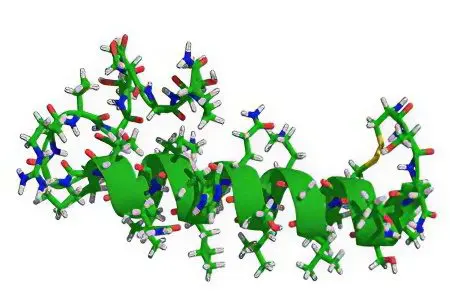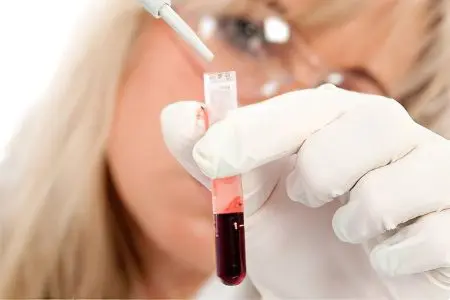Contents
Calcitonin – what is it?

Calcitonin is a thyroid hormone that is produced by special C-cells. These cells are located more often near the follicles, which is why they were previously called parafollicular cells. C-cells are of neuroendocrine origin and are formed in the pancreas during fetal development of the human body. The synthesis of calcitonin is the main function of C-cells.
The functions of calcitonin are not yet fully understood, which distinguishes it from other thyroid hormones. The number of C-cells that secrete calcitonin is significantly less than the number of B- and C-cells included in the follicles of the gland. If the hormones T3 and T4 are examined to determine the function of an organ, then the value of blood calcitonin is used for other purposes.
In various textbooks and manuals, the hormone calcitonin is considered as an antagonist to parathyroid hormone, a product of the parathyroid (or parathyroid) glands. The value of parathyroid hormone lies in the activation of special cells – osteoclasts. The latter, under the action of this hormone, destroy bone tissue, as a result of which calcium is released from it and enters the bloodstream. Another function of the parathyroid hormone is to increase the reabsorption of calcium ions in the tubules of the kidneys from the primary urine. Parathyroid hormone also stimulates the conversion of vitamin D into its active form, calcitriol, which ensures the transport of calcium ions from the small intestine into the blood. Thus, the end result of the activity of parathyroid hormone is an increase in the level of calcium in the plasma, and calcitonin has the opposite effect.
In terms of its activity, calcitonin is much weaker than parathyroid hormone; therefore, it cannot be argued that calcium metabolism in the body is regulated only by these two hormones. In this complex process, in addition to parathyroid hormone and calcitonin, vitamin D and many other compounds take part.
The C-cells of the thyroid gland synthesize calcitonin in very small amounts, so its concentration in the blood is normally very low. Also, in small amounts, this hormone can be produced in the intestines. In this article, we will consider calcitonin as a tumor marker, which is used in the diagnosis of a formidable tumor from the thyroid tissue – medullary cancer.
Blood test for calcitonin

The concentration of calcitonin can now be determined in many laboratories that use various equipment for this purpose. The most reliable information about the content of this hormone can be obtained using 3rd generation analyzers based on the immunochemiluminescent method. More common analyzers of the 2nd generation using enzyme immunoassays are cheaper, but have a serious drawback – a significant error in the result. Their use can lead to inaccuracies in the diagnosis and subsequent treatment of patients.
From the C-cells of the thyroid follicles, a very dangerous malignant tumor can develop – C-cell carcinoma, or medullary cancer. A feature of this tumor is a relatively slow but steady growth. Over time, medullary cancer metastasizes to the lymph nodes located in the neck and mediastinum, with blood flow metastases can also enter the lungs, liver, bones, and even the brain. Treatment of C-cell carcinoma presents significant difficulties, since the tumor does not respond to antitumor chemotherapy drugs and radiation therapy. Only antitumor agents from kinase inhibitors can have a slight effect on C-cell carcinoma. The only effective treatment for this type of cancer is surgery in the early stages of the process. This is the only way that gives a chance for recovery, provided that cancer is diagnosed early.
Since C-cell carcinoma grows from cells that secrete calcitonin, its level in the blood rises sharply already in the early stages of cancer. That is why the content of this hormone is of such interest to endocrinologists and surgeons. The study of calcitonin concentration is the most reliable and early method for determining medullary cancer, which allows saving more than one thousand human lives.
Approximately 100-150 new cases of C-cell thyroid carcinoma are registered annually throughout Russia. Statistical studies have shown that in 16 densely populated regions of the European part of Russia, about 40 diagnoses of medullary cancer are made per year.
Among all cases of thyroid tumors, the most dangerous are anaplastic and medullary forms. While effective treatments have not yet been developed for anaplastic cancer, C-cell carcinoma is quite curable if diagnosed early. And only a blood test for calcitonin can help in this.
In 2012, the European Thyroid Association added an indication to the need for a single determination of calcitonin in all patients with nodules in the thyroid gland in the recommendations. This analysis does not have to be performed every year, a second study in the case of the first normal result is assigned only if new nodes have been registered.
This fact led the European endocrine community to believe that the financial costs of conducting 300 studies would be justified if at least one of them would allow to establish the presence of medullary cancer. At the same time, the American Thyroid Association still believes that such a massive study of calcitonin is not economically justified. This concerns only the financial part of the issue, the clinical value of this method is beyond doubt.
What is the norm for calcitonin?
When interpreting the results of a blood test for calcitonin, it must be taken into account that the lower limit of the norm for this hormone does not exist. Even its zero concentration is within normal limits. To exclude or confirm the diagnosis, it is important that the level of calcitonin is not higher than those values that are defined as the upper limit of normal. This limit is specific to each specific analyzer and each reagent kit used.
It makes no sense in this article to indicate the normal values of the level of calcitonin, since they fluctuate significantly in different laboratories due to the use of completely different analyzers. Therefore, the concept of the norm becomes very vague. In modern laboratory centers, normal values are indicated on the same form on which the result of the analysis is issued.
When calcitonin is elevated

Any even slight increase in the content of calcitonin is a serious reason for an in-depth examination of the patient by specialists experienced in the diagnosis and treatment of C-cell carcinoma.
It is believed that the probability of medullary cancer at a concentration of calcitonin above 100 pg/ml approaches 100%. There is a direct relationship between the degree of increase in this hormone and the stage of cancer, as well as the presence or absence of distant metastases.
If the fine needle biopsy shows that the thyroid nodules are benign, but the level of the hormone is elevated, the second analysis has an advantage, since the probability that the results of the study are erroneous is very small. In case of a significant excess of the upper limit of the norm (more than 100 pg / ml), the patient is completely removed the thyroid gland and all nearby lymph nodes in order to exclude the presence of regional metastases. Therefore, the determination of calcitonin is a very serious analysis, and its results should be as accurate as possible.
It should be noted that hereditary predisposition contributes to the occurrence of medullary cancer. In about 50% of cases in people with C-cell carcinoma, children also get sick. Sometimes it is necessary to remove the thyroid gland in children aged 5-7 years and even younger to prevent the growth of malignant cells. In such cases, even the slightest increase in calcitonin indicates that the doctor is doing everything right.
There are difficult situations when the level of the hormone slightly exceeds the norm, that is, below 100 pg / ml, but above the upper limit of normal values. Such a result can indicate both a very small tumor and its absence. In any case, an elevated hormone level should be contacted by a specialized endocrinological center for additional research.
These may include:
Fine-needle puncture of the node with histological analysis of the tumor and determination of calcitonin in the wash from the needle;
Stimulated test with the study of calcitonin in the blood after the administration of calcium gluconate.
The information described above allows us to deduce the following provisions:
Calcitonin is a tumor marker used to diagnose medullary cancer;
A blood test for the hormone calcitonin must be taken in all patients with nodes in the thyroid gland;
The analysis should be taken in a specialized laboratory that conducts research on a third generation chemiluminescent analyzer;
Any increase in the level of calcitonin in the blood should be a reason for contacting a specialized endocrinology center.









